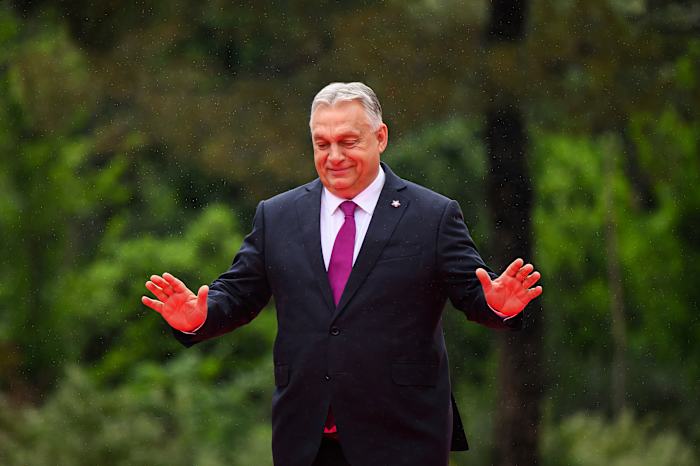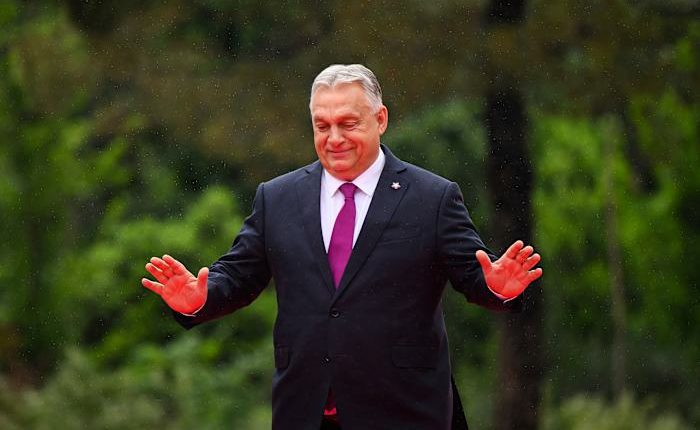Share this @internewscast.com

BUDAPEST – Approximately 10,000 people participated in a significant protest in Hungary on Sunday, which some attendees described as an act of defiance against recent measures by the right-wing populist government to curtail fundamental rights and suppress independent media.
The event, part of a recent surge in anti-government protests, occurred shortly after a legislator from Prime Minister Viktor Orbán’s party introduced a bill that would enable the government to oversee, restrict, punish, and potentially shut down media outlets and non-governmental organizations considered a threat to national sovereignty.
This legislation, often compared to Russia’s “foreign agent” law, is anticipated to pass in the parliament, where the dominant Fidesz party possesses a two-thirds majority. Many of Orbán’s critics view this as one of the most oppressive measures the long-time leader has imposed on his dissenters over the past 15 years.
Protesters on Sunday filled the square beside Hungary’s parliament in central Budapest to denounce the bill, which would allow the government to blacklist organizations that receive any amount of financial support from outside Hungary, and subject them to intrusive monitoring, searches, major fines and possible bans on their activities.
Politicians in Orbán’s party, as well as the Sovereignty Protection Office, a controversial government body tasked with identifying alleged threats to Hungary’s sovereignty, have specifically identified numerous media outlets and anti-corruption organizations that they claim are serving foreign interests.
From a stage at the protest on Sunday, speaker Jakab Tóth said the bill submitted this week “is nothing more than a threat, a threat against people being able to express their opinions clearly and freely.”
Tóth added he believes the government has a responsibility to protect the sovereignty of citizens to exercise free speech and take part in public life. “If it doesn’t belong to all of us, if not all of us are free, then sovereignty is solely and exclusively the sovereignty of the government,” he said.
Orbán, who polls show faces the most serious challenge yet to his power in elections scheduled for next year, has claimed that foreign interests, primarily originating in the United States and in neighboring Ukraine, have sought to instrumentalize independent media outlets and anti-corruption watchdogs in Hungary to influence public opinion with the aim of toppling his government.
Those organizations have vehemently denied such claims, and argued that the work they perform is done to professional standards and in the public interest.
Orbán has for years enacted crackdowns on NGOs and independent media, passing laws that critics say seek to stigmatize and obstruct groups that provide protection for women and minorities, offer legal and human rights assistance and expose official corruption.
Those efforts ramped up in 2023 when Orbán’s right-wing populist government launched the Sovereignty Protection Office, an authority tasked with investigating organizations and media outlets it deems to be exerting foreign influence.
The bill introduced last week outlines a broad definition of what constitutes a threat to sovereignty. Organizations may be targeted if they oppose or portray in a negative light values such as Hungary’s democratic character, national unity, traditional family structures, or Christian culture — suggesting that even legitimate criticism of government policy could be treated as a national security threat.
Sunday’s demonstration came after two-and-a-half months of weekly protests against an anti-LGBTQ+ law passed in March that banned Pride events and allows authorities to use facial recognition software to identify individuals attending the festivities.
Hungary’s government has argued its policies on LGBTQ+ rights are necessary to protect children from it calls “gender madness.” But many critics believe the measures were designed to stir up animosity against sexual minorities and help Orbán mobilize his right-wing base ahead of next year’s elections.
Copyright 2025 The Associated Press. All rights reserved. This material may not be published, broadcast, rewritten or redistributed without permission.











